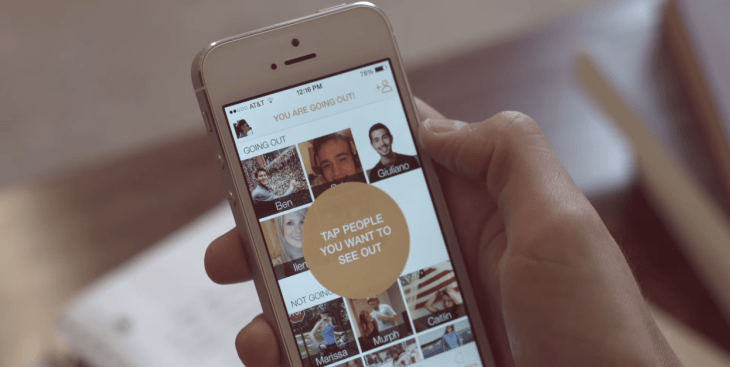Over the past few months, a sexual harassment and discrimination lawsuit from a former Tinder employee has rocked Tinder. CMO Justin Mateen was suspended almost immediately (and then resigned)
and then, earlier this month, the CEO Sean Rad abruptly resigned, taking role of President.
Today, however, the best friends from Southern California are venturing into yet another project together. Rad and Mateen have joined in on the seed round for an app called WiGo (Who Is Going Out?) aimed at college students, and they will come on as active advisors at the company.
The round also includes investment from Paul English, founder of Kayak, as well as Rue La La and Lids founder Ben Fischman and Kevin Colleran, one of the first ten employees at Facebook, and totals approximately $700k in seed.
The idea behind WiGo is painfully simple. After the app has verified that you are a college student through a .edu email address, you are automatically linked in to your school-wide network. From there, you simply post where you’re going tonight, and friends can join in. There’s also the option to ‘tap’ another user, sending them a push notification saying that you want to see them at XX place, as well as chat functionality.
You can see how this might easily transfer over to a college hookup app, with the ability to beckon someone to a specific party or location. In fact, founder Ben Kaplan referred to the tap functionality as “flirtatious.”
Every morning, the app wipes everything clean, including the places you’ve been and the chats you had the night before. WiGo holds on to certain information around events for machine learning purposes, so that the company can track a place that goes by multiple names or nicknames.
Founder Ben Kaplan told TechCrunch that he’s well-researched on the social planning failures that have come before, and says that the format of WiGo and the company’s focus on exclusive college-based networks and growth will be the differentiator.
“For one, we don’t use Foursquare places or a map of any kind,” said Kaplan. “In college, a lot of places have nicknames or people are going to an apartment or basement. Foursquare and maps don’t work for us the way that simple communication does in the app.”
The app also focuses pointedly on college campuses and ensuring that users are only communicating with fellow students at the university in which they are enrolled. Each campus must reach a certain threshold, based on the size of the school, in order for that campus to be unlocked. So far, users have downloaded the app at over 1,100 campuses, with around 200 currently being activated.
[gallery ids="1083134,1083133,1083132,1083131"]
The largest campus on the platform is the University of Maryland, at 27,000 undergrad students, of which ten percent are using the platform.
“The biggest challenge to us is getting to critical mass,” said Kaplan. “The reason that other social planning apps have failed is because everyone has to be using it for it to be successful. That’s why we’re going one school at a time to make sure that it’s valuable to our users.”
Rad and Mateen should be helpful in this growth stage, given that much of Tinder’s early success can be traced back to the marketing and outreach done by the early team on college campuses.
For now, the company isn’t looking into revenue options, but rather focusing on the user experience. Kaplan did say, however, that they’ve considered the fact that they will have very valuable data around where people are going and where they want to go.
If you want to learn more about WiGo, you can check out the website here.
